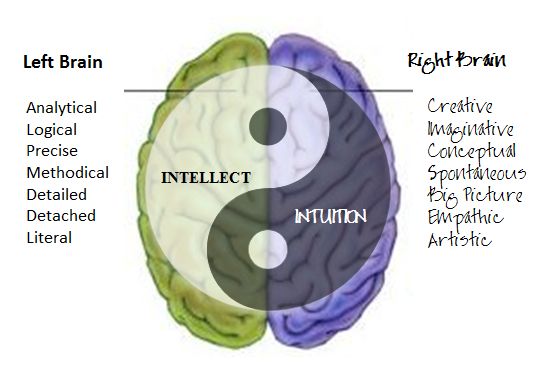|
Steve Jobs once said that intuition is more powerful than intellect. As it turns out, Jobs was onto something, and the scientific community backs him up. It seems that we've been giving intuition far too little respect.
While that's all very interesting in a clinical setting, you have to ask yourself if it holds true in real life. Apparently, it does. When it comes to making major decisions, your intuition can matter just as much as your intellect.
In one study, car buyers who relied on careful analysis of all of the available information were happy with their purchases about 25% of the time, while buyers who made quicker, more intuitive purchases were happy with their purchases about 60% of the time. Intuition comes from the primitive brain; it's an artifact of the early days of man when the brain's ability to detect hidden dangers ensured our survival. These days, we use this capability so little that we don't know how to listen to it properly. Whether you listen to it or not, your intuition is healthy and functioning. If you want to make better decisions in life, you'd do well to brush up on your intuition skills. You can start by emulating some of the habits of highly intuitive people. They slow down enough to hear their inner voice. Before you can pay attention to your intuition, you first have to be able to hear it amid the cacophony of your busy life. You have to slow down and listen, which often requires solitude. Taking some time away from the everyday, even something as brief as going for a walk, is a great way to turn up the volume of your intuition. They follow their inner voice. One of the primary reasons that some people are more intuitive than others is that they actually listen to their gut feeling instead of dismissing or doubting it. And that doesn't mean that they ignore their analytical mind and their critical thinking skills; there's a difference between using reason as a system of checks and balances and using it to talk yourself out of what your intuition knows to be true. They practice empathic accuracy. I'd probably lose you if I said that highly intuitive people read minds, so I'll use the scientific term: empathic accuracy. It's not magic; it's an intuitive awareness of what other people are thinking and feeling, using cues such as body language and tone of voice. It's an extremely powerful form of empathy that helps foster deep connections with other people. They practice mindfulness. "Mindfulness" sounds even more New-Agey than trusting your intuition, but it's really just a fancy term for focusing on being in the moment. Mindfulness is a great technique to filter out all of the distractions in your environment-and your brain. When you do that, you can hear your intuition loud and clear. They nurture their creativity. Did you ever have one of those paint-by-number kits when you were a kid? Talk about turning art into a science-all you have to do is put the right color in the right little space. You may end up with a pretty painting, but the only intuition involved is guessing what colors you're supposed to use in those really tiny spaces. No paint-by-numbers kit in the world can make a skilled artist create something as novel and monumental as the Sistine Chapel or the Mona Lisa. The missing ingredient is intuition. And, just as intuition is the secret ingredient in creativity, being intentionally creative strengthens your use of intuition. They trust their gut. Have you ever made a decision and immediately started to feel sick, maybe even kind of clammy? Well, that affective experience is the body's way of informing you that the decision your analytic mind came to is at odds with your instinct. They analyze their dreams. If you accept the science that demonstrates the power of intuition, it's not much of a leap to accept that our dreams are often manifestations of intuition. Sure, sometimes dreams are nonsense, but they often try to tell us something. Intuitive people don't just think, "Wow, that was a weird dream!"; they ask themselves, "Where did that come from, and what can I take away from it?" Bringing It All Together. The science is clear: intuition is a powerful force of the mind that can help us to make better decisions. Fortunately, intuition is a skill that you can hone by practicing the habits of highly intuitive people. Dr. Travis Bradberry About The Author: Dr. Travis Bradberry is the award-winning co-author of the #1 bestselling book, Emotional Intelligence 2.0, and the co-founder of TalentSmart, the world's leading provider of emotional intelligence tests and training, serving more than 75% of Fortune 500 companies. His bestselling books have been translated into 25 languages and are available in more than 150 countries. Dr. Bradberry has written for, or been covered by, Newsweek, TIME, Business Week, Fortune, Forbes, Fast Company, Inc., USA Today, The Wall Street Journal, The Washington Post, and The Harvard Business Review. Comments are closed.
|
Senior Living Recruiting is what we do.AuthorLM Hurley & Associates Executive Recruiting Archives
October 2023
Categories |

